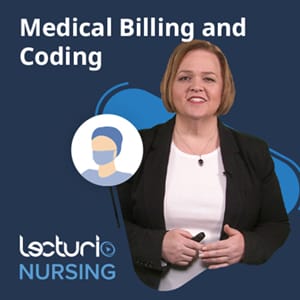What is medical billing and coding?
Medical coding involves assigning alphanumeric current procedural terminology codes to each service or equipment piece involved in a patient’s treatment. These codes are clear, universal identifiers for communication between providers and insurance companies.
Billing professionals then use these codes to file claims and manage payments.
Why is it so important? Accurate medical billing and coding ensures that you, as a healthcare provider, get proper payment for your services. It needs to be clear to all parties which services were given to any patient.
Take the Course: Billing and Coding
Get a headstart with the online class with Prof. Rhonda Lawes, PhD!
What you need to know as a new provider
It may not be the most glamorous part of being a healthcare provider, but being comfortable with the medical billing and coding processes is vitally important. You will spend a surprising amount of time in your daily clinical life with administrative tasks surrounding billing and coding.
- Knowing the most commonly encountered medical codes by heart will not only come in very handy, but will be expected of you.
- While you may have billing staff, you still oversee them and need to have an overview of the financial aspect of your practice.
- Be prepared to explain charges and billing to patients. Not only does it help them and makes the process smoother, it also helps prevent disputes.
Medical billing as a career
Skills needed
Medical billing is a challenging career path for people who enjoy detail-oriented and thorough work. Other than an eye for detail, being comfortable with numbers, and being able to understand the intricacies of insurance and billing policies, medical billers need to have a solid understanding of medical terminology and anatomical and physiological basics.
Career paths and options
Medical billing typically does not necessarily require a college degree. If you do want to graduate, suitable bachelor’s degrees leading into the career path are health information management or health care administration.
While there are jobs available that do not require certification, getting certified as a medical biller can increase your competitiveness, help you earn a higher salary, and is a requirement for many available roles. A popular option is the Certified Professional Biller certification by the AAPC. You can also combine medical billing and coding by getting certified, for example, as a Certified Professional Coder or a Certified Billing and Coding Specialist.
Getting certified can take between one and three years (for an associate degree).
Salary and roles
Becoming a medical biller might start with a data entry position, moving into coding, claim analysis, and billing management. According to the U.S. Bureau of Labor Statistics, medical records specialists and health information technicians, which include medical billers and coders, earned a median annual wage of approximately $48,780 in 2023.
Key terms and abbreviations in medical billing
What is ERA in medical billing?
ERA stands for Electronic Remittance Advice. It is a digital version of a paper-based remittance advice that details the outcome of a processed claim, such as payments and service denials, sent by payers to providers.
What is an entity code in medical billing?
Entity codes stand for the type of health plan a patient is enrolled in. They determine where and under what terms the claim needs to be sent and handled.
What is ABN in medical billing?
ABN stands for Advance Beneficiary Notice. Patients under Medicare Part B (non-hospital medical insurance) receive this before treatment to make them aware they might be responsible for payment.
What is capitation in medical billing?
Capitation is a payment system where healthcare providers are paid a set amount per patient per period, regardless of which and how many services the patient receives. It is meant to encourage cost-effective care. Learn about the pros and cons of different healthcare reimbursement models here.




